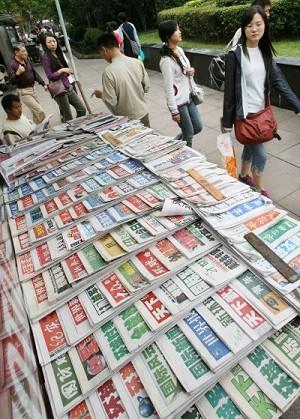According to the Hong Kong-based Information Center for Human Rights and Democracy, China has further tightened its control over media in the run-up to the Chinese Communist Party (CCP)’s 17th National Congress. It is estimated that over one hundred radio stations throughout the country have been shut down.
In Nanjing City alone, there have been 12 radio stations that have been shut down, as authorities are concerned that the contents of their programs could possibly incite politically-fueled incidents in the run-up to the 17th National Congress—local radio talk show listeners cited recent topics regarding sex and the supernatural.
Radio Free Asia (RFA) reporters placed international calls to multiple programs of the Nanjing Radio Station, yet the only person they could reach was an advertising executive.
A resident of Nanjing City stated that she was unaware whether local radio stations’ programs had changed, but recently she did notice significant changes in the television programming, as she could no longer view the programs of various channels.
“It seems that some channels are shut down, and the programs of other channels are different from before. The Phoenix 3 Channel is not available, and there are only about ten channels available at the moment,” she observed.
Ex-China Ocean News reporter, Zan Aizong from Zhejiang Province, said that whenever there was an important meeting convening in China, the government would tighten its media control before and after the event.
“Some programs would be heavily edited in the run-up to every CCP National Congresses, often by adding many advertisements,” said Zan. “But after the National Congress concluded, programming would return to normal. Before the 16th National Congress convened, a friend of mine working at a radio station once informed me that programming would be cleaned up.”
The Hong Kong-based Information Centre for Human Rights and Democracy added that since last July, the Chinese government has stepped up efforts to jam the broadcast of programs from overseas radio stations. It is believed that the Chinese military has been involved with this large-scale jamming operation, and the operation is expected to last until the end of the 17th National Congress.
“The jamming operations have been around for a long time,” said Zan. “For instance, when I lived in Beijing a couple of years ago, I couldn’t access programs from overseas radio stations whatsoever. It was impossible to tune in to these stations. Only those who live in remote farm villages may be able to tune in to them, as the space is so vast and so expansive that the jamming would be less effective. As a result, people might be able to access the on-line programs, yet the jamming is always there. As much as they are able, they will never let the so-called ‘unwanted voices’ be heard in China.”
In terms of the effectiveness of the Chinese government tightening its control over media in the run-up to every important meeting or holiday in China, Zan thinks it is limited.
“The Chinese people are not idiots. The Chinese authority has lied for so long. At this point, people wouldn’t believe anything it said even if it wasn’t jamming these signals,” said Zan of the Chinese authority’s effectiveness in controlling the media. “People are fed up with the programs broadcast by China National Radio and the China Central Television as well as the coverage of the People’s Daily and the Xinhua News Agency. The Chinese people have awakened.”
Zan added that nowadays with the Internet, text messages and simple word of mouth have become popular methods of conveying information in Chinese society. He says that people now find out what’s important through their computers and cell phones. As a result, they no longer rely on the official government media.

